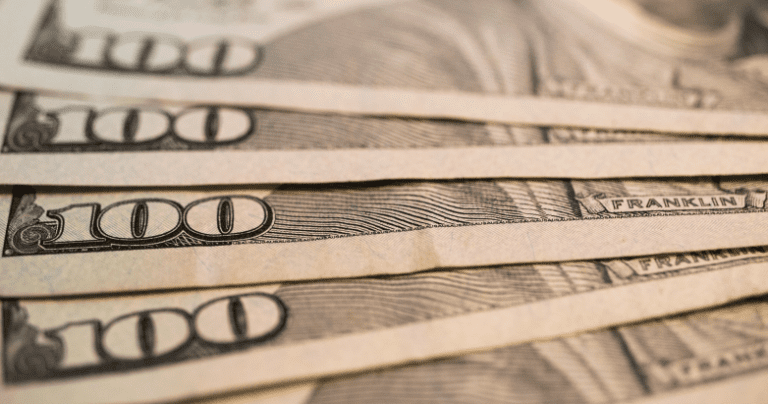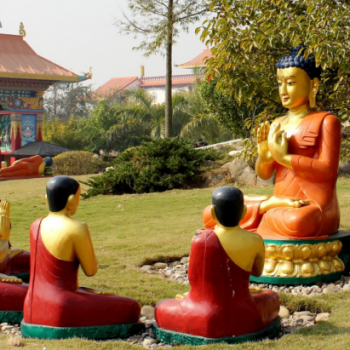
The Buddha said:
One should not strive everywhere, One should not be another’s man. One should not live depending on another, One should not make a business of Dhamma (Ud. 6.2 Ireland).
The Buddha did not want people to “make a business” out of selling the Dharma. Yet in a capitalistic economy, everything is for sale. People buy and sell, and make a lot of money selling the Dharma. The commercialization of Buddhism in Western countries is well underway. And the sad thing, the poor are being forgotten.
Selling the Dharma
The Buddha said, “One should not make a business of Dhamma (Ud. 6.2 Ireland). Another translation says, one “should not go about as a trader in the Dhamma” (Ud. 6.2 Thanissaro). And yet another translation puts it this way, “one should not live trading in Dhamma” (Ud. 6.2 Anandajoti). Yet that hasn’t stopped Buddhist teachers from cashing in on the Dharma.
Not to be fair, there are some teachers who do not ask for a certain amount, but whatever you can afford. This seems the best way to balance full time teaching and keeping the door open for the poor and underprivileged. But this is not what a lot of teachers do. I am going to pick on Jack Kornfield and Tara Brach.
They are offering “A Two-Year Training Program” called “The Mindfulness Meditation Teacher Certification Program.” And they say that, “Upon completion of the program, you will be certified by both the Awareness Training Institute and the Greater Good Science Center at the University of California at Berkeley.” Sounds great until you hear the price.
The tuition for the course is $6,700. This does not include “lodging, meals, and transportation for in-person events; required books from required or optional reading list (text books); additional private sessions with Mentor (can be purchased separately).” Oh, you also have to complete the following two prerequisites. The first prerequisite is to have completed the ATI Power of Awareness online course, which costs $297. The second prerequisite is to have attended “at least one 6-night, residential, silent, mindfulness meditation retreat in the style of Insight, Vipassana, or Goenka meditation.”
They claim, “We have seen a need for more qualified mindfulness meditation teachers to support the growing popularity of mindfulness, self-compassion, and meditation.” But only the rich can afford such a program. So those of us, myself included, will never be able to afford the $6,700 tuition. Nor can I afford to take a week and a half off of work, travel to California, and pay for the residential program. Plus you have to win the lottery. No, seriously, at Spirit Rock Insight Meditation Center “a lottery is used to select retreatants.”
Clearly the poor are not welcome. You wonder why Buddhism in America is made up of primarily white middle class men and women? If anything should be free, or fully covered by scholarships, it is training to become a meditation teacher. The Buddha didn’t change his followers, why do Buddhist teachers “make a business of Dhamma (Ud. 6.2 Ireland).
Buddhist Consumerism and Spiritual Materialism
The American Heritage Dictionary of the English Language (5th Ed.) defines consumerism as the “Attachment to materialistic values or possessions.” It defines materialism as “Concern for possessions or material wealth and physical comfort, especially to the exclusion of spiritual or intellectual pursuits.”
Although I am not a fan of Chogyam Trungpa, I do agree with what he once wrote, “The Problem is that ego can convert anything to its own use, even spirituality” (13). This goes for Buddhism as well. People buy multiple Buddhas, one for every room. Then they add pictures and nicknacks. They buy necklaces, rings, and mugs with the Buddha on it. But is this really the best use of our money?
And then we turn to the saying of the Buddha that, “One should not make a business of Dhamma (Ud. 6.2 Ireland). It is funny how quick some people are to explain it away. I think of myself and how this applies. I sell Buddhist books on Amazon. Should I give them away? I can’t give paperbacks away, they cost money to make. But what about the ebook version? Should I not get paid for the research and work I put into it?
And then there is my podcast, 5 Minute Dharma. This is free, with no ads. In fact, it costs me about $9.00 a month to host the mp3 files and web page. This isn’t a very good business model. I should be selling advertisements or merchandise. But no, the podcast is ad free on my end.
And then there is my writing on Patheos. I make very little from my articles here. It doesn’t even cover the cost of my podcast. The good thing is I am not charging for reading my articles, the bad thing is the advertisements. But I am thankful for the exposure.
It is not easy to decide how to apply the Buddha’s directive to “not make a business of Dhamma (Ud. 6.2 Ireland). I think that listening to the Dharma should be free, and I think teacher training should be free to those who need it. I understand that teachers need to make a living, but “one should not live trading in Dhamma” (Ud. 6.2 Anandajoti).
Works Cited
References for Translations can be found on the Translations Used page.
- Kornfield, Jack and Tara Brach. “The Mindfulness Meditation Teacher Certification Program.” Sounds True. Web
- Trungpa, Chogyam. Cutting Through Spiritual Materialism. Boston: Shambhala Publications, 2020. Print.
Copyright © 2020 Jay N. Forrest. All Rights Reversed.
Image by benscripps via Pixabay











